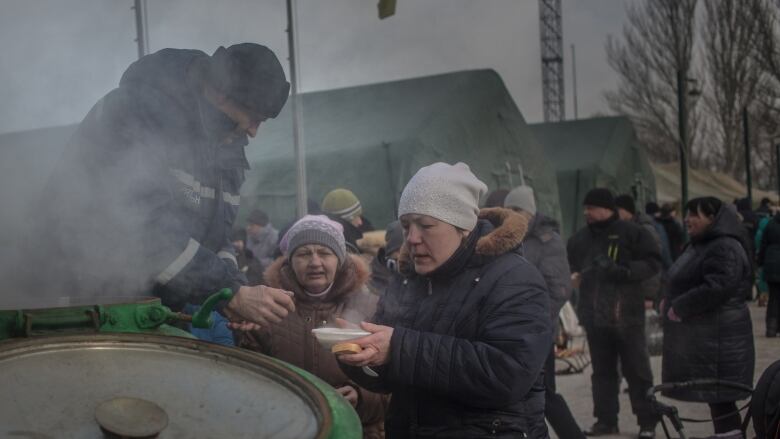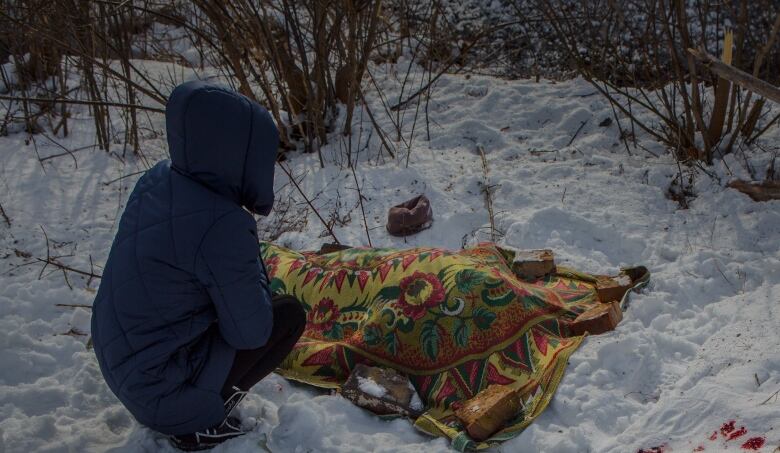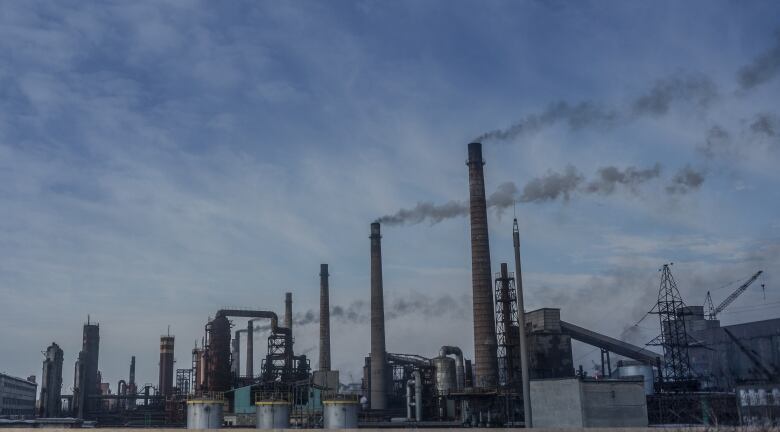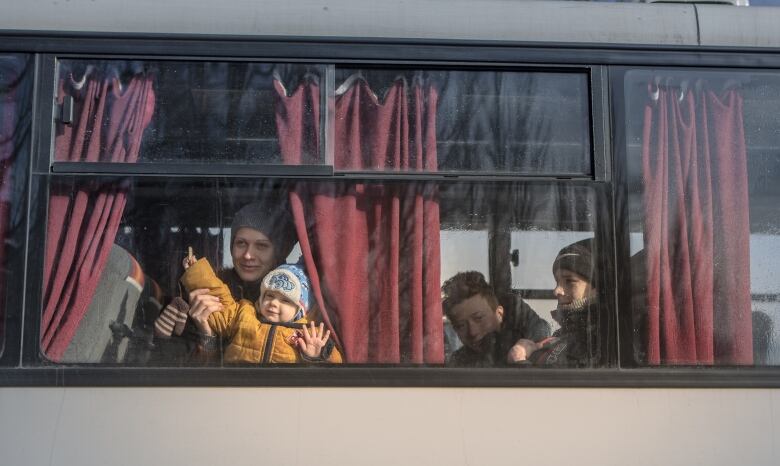'It's so much worse': Renewed fighting in Ukraine pushes town to brink of humanitarian catastrophe
'It's the fourth day of this, and now there's no heat, no water,' Avdiivka resident says

After two years of relative calm, Ukraine's war with Russian-backed rebels took a deadly and destructive turn this week, pushing one town in the country's eastern regionto the brink of a humanitarian catastrophe.
Intense shelling has left Avdiivka, a community of 20,000 people located just north ofDonetsk, without electricity, heat or water during a particularly frigid cold spell that's seen temperatures drop to -22 C at night.
But it's not the cold residents dread the most; it's the threat of lethal Grad rockets, a type of unguided heavy artillery developed by the Soviet Union.
On the outskirts of town Wednesday,a distraught 24-year-old woman was being consoled by an older woman. Nearby, lying under a blanket in the freezing cold, was the body of the young woman's mother, Katya Volkova, 60. She'd been out for a walk at 7:30 a.m. when she was struck by shrapnel from a Grad strike near her home.

The Grad was used early and often during the first year of the war, but rarely since February 2015, when Russian-backed separatists captured the strategic town of Debaltseve. That battle and the enormous losses incurred by the Ukrainians led to the signing of the Minsk IIagreement, a heavily criticized deal that nonetheless helpedmaintain the uneasy peace that ended this week.
Ukrainian military officials say the separatist forces struck first againstAvdiivka. The town is a government stronghold but also a suburb of Donetsk, which is a key rebel base. Both sides are entrenched and heavily armed.
It's impossible to sleep now because of the shelling.- AniaBohatysh, 69, resident of Avdiivka
Up to 20 homes were destroyed during Tuesday night's shelling, according to Oleksander Turchynov, the secretary of the National Security and Defence Council of Ukraine, who was in AvdiivkaWednesday to assess the situation.
"There was shelling this morning, but the situation is stabilized for the moment," he said. When asked if he expects the attacks to continue, Turchynov said the Ukrainian military is prepared for all scenarios.

NATO Secretary General Jens Stoltenberg has urged Russia to use its "influence" over the separatists to end the fighting and the UN Security Council has called for an immediate cessation of hostilities.
The war in Eastern Ukraine began in the early spring of 2014after Russia annexed Ukraine's Crimean peninsulaand began sending troops and military equipment across the border into Ukrainian territory.
Many experts believe Russia's goal in backing the separatists in the east is to foment chaos in Ukraine and prevent it from joining NATO and the European Union.
The escalation of violence comes just days after Russian President Vladimir Putin had his first official phone call with new U.S. President Donald Trump, who'smade it clear he hopes to have closer ties with Russia but has been less clear about whether he thinks Russia was wrong to annex Crimea.
Reports indicate the latest round of fighting has killed six Ukrainian soldiers and wounded 48 others. The total number of civilian casualties isn't yet clear. The UN estimates 9,700 people have been killed and more than 22,000 wounded during the three years of fighting with a further 1.7 million forced to flee their homes.
'No heat, no water'
The regional government and volunteers have set up a makeshift humanitarian outpostin Avdiivkato offer residents relief from the freezing cold. Folks lined up for hot tea, soup and loaves of bread.

Vitaliy, a 77-year-old pensioner who, like others in line, didn't want his last name published, saidthe fighting is as bad as it was in early 2015 when he decided to flee the town.
"It's the fourth day of this, and now there's no heat, no water."
A cokingplant worker named Yura, 49, half-jokingly responded that all he can do when the shelling starts is pray, drink vodka and swear.
- Canada examining options for additional support for Ukraine
- At least 8 killed as fighting in Ukraine intensifies again
His co-worker, Igor, 51, said they have nowhere else to go.
"I was thinking about leaving my house to go to my mother's house, but then her house got shelled, so where should I go?"
Evacuation
The town's giant coking plantis the largest employer in the region and a key cog in Ukraine's steel industry. Director Musa Magomedov, 47, said the plant normally provides heatto 90 per cent of the surrounding area, but is running at a critically low 20 per centoutput.

With temperatures expected to remain around -15 C,and no signs the violence will stop, the Ukrainian government decided to evacuate Avdiivka's most vulnerable. But only 145 residents, including 88 children, took up the offer.
One of those waving goodbye Wednesday was Ania Bohatysh, 69, whose daughter and 17-month-old grandson were leaving for the safety of a nearby city.
"It's impossible to sleep now because of the shelling," she said, "and it's so much worse than it has been since 2015. There's no electricity, there's no water, there's no heat, so they had to leave."













_(720p).jpg)


 OFFICIAL HD MUSIC VIDEO.jpg)
.jpg)



























































































